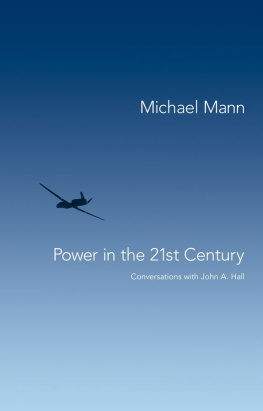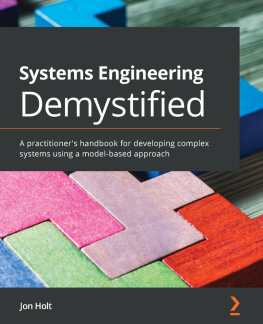Published by
World Scientific Publishing Co. Pte. Ltd.
5 Toh Tuck Link, Singapore 596224
USA office: 27 Warren Street, Suite 401-402, Hackensack, NJ 07601
UK office: 57 Shelton Street, Covent Garden, London WC2H 9HE
British Library Cataloguing-in-Publication Data
A catalogue record for this book is available from the British Library.
UNDERSTANDING SYSTEMS
A Grand Challenge for 21st Century Engineering
Copyright 2018 by World Scientific Publishing Co. Pte. Ltd.
All rights reserved. This book, or parts thereof, may not be reproduced in any form or by any means, electronic or mechanical, including photocopying, recording or any information storage and retrieval system now known or to be invented, without written permission from the publisher.
For photocopying of material in this volume, please pay a copying fee through the Copyright Clearance Center, Inc., 222 Rosewood Drive, Danvers, MA 01923, USA. In this case permission to photocopy is not required from the publisher.
ISBN 978-981-3225-94-7
ISBN 978-981-3225-95-4 (pbk)
Desk Editor: Christopher Teo
Typeset by Stallion Press
Email:
Printed in Singapore
To our families
Preface
This text is aimed at improving reader intuition about the behavior of simple and complex systems. The target audience includes engineering instructors and students curious to explore the grand challenges on which careers are selected.
In general, systems are assemblies of intercommunicating components that we find throughout nature and society. They are of primary interest because of the significant influence they have on our daily life. Complexity is an important feature of some systems that is difficult to precisely define, but is often easy to recognize from characteristic properties such as emergence and sudden equilibrium-state transitions. From solid-state physics to insect colonies, large corporations and social networks each field of study recognizes complexity in their analysis precisely because they share common properties. Defining complex systems is a little like walking in the woods at night; properties are difficult to see if you look at each component directly, but are more readily sensed by our peripheral vision as large-scale properties emerge. How can something so important and fundamental in nature and society still be poorly understood?
Part of the answer lies in the difficulty of objectively seeing any environment in which one is totally immersed. Consider for example the round-versus-flat-Earth debate. Before the 3rd century BC, ancient Greek scholars knew the Earth was round by studying clues offered by the moon and eclipses. Yet debate raged for many centuries until Magellan circumnavigated the globe in the 16th century. The evidence became plain for all in the 1960s during the moon missions when those amazing images of our round blue globe first were published. Often new insights are found from changing our perspective on a problem, and that, in part, is what we hope to achieve here with regard to understanding systems.
Eliminating confusion about complexity also requires that we have available the analytical tools, shared experiences, and a descriptive language necessary to understand the many different abstract concepts associated with the nature of systems. For many in science and engineering, the tools of modeling and the language of mathematics hold the key to understanding any and all phenomena, even those as complex as the origins of life on Earth. Reductionist tools, which have served us well for hundreds of years when we hope to explain natures mechanisms, yield few insights when studying the largest and most complex systems. Mathematics is a tool for understanding when using our minds foveal vision. Nevertheless, the literature is full of attempts to apply mathematical modeling for the analysis of complex systems. We can find numerous texts describing properties of linear and nonlinear systems, and the roles of feedback, stability, chaos, control, robustness, or the tools provided by information, graph and bifurcation theories. Each offers credible insights into system mechanisms that have advanced our ability to predict aspects of system behavior, but often those views are simplified. The full nature of complex systems continues to escape our collective understanding, and, more importantly, our ability to predict their volatile behavior.
With this in mind, the authors have been meeting for at least an hour each week for nearly five years to explore alternative perspectives and approaches to systems analysis. We think we have a promising direction identified but, because it is still viewed through our peripheral vision, it has not yet risen to the level of a mathematical theory. (At least one of us doubts it ever will!) Consequently the story is difficult to tell. On the other hand, our story does borrow a generalized version of an important mathematical tool from engineering - eigenanalysis - to explore complex systems. Unfortunately this tool comes with baggage. Knowledgeable engineers and scientists say, Wait a minute! Eigenanalysis only describes linear systems and all of the most interesting systems are nonlinear. True. Also, most advanced engineering students can compute eigenvalues when given a matrix but they have little or no intuition about what they mean physically and how essential they are to the nature of a system. We feel it is important to explore complex systems without mathematical analyses, at least initially, because math can push us into thinking traps that prevent new ideas from emerging. A technical but math-free description of systems is our goal in this book.
We set out to tell a very technical story using only shared concepts from everyday life and classical problems well known from a readers schooling or reading in science and maybe a little engineering. With something as complicated as complex systems, intuition is a much more powerful tool for initial exploration than the analytical skills needed for advanced research. We consider the following chapters as an unusual type of engineering textbook. One intended to both challenge the assumptions of classically-trained engineers and introduce important new concepts to students just beginning to think about systems. We claim no confirmed breakthroughs in understanding specific complex system, but we hope the discussion provides interested readers with new intuition about all complex systems based on fundamental principles that shed light on their inner workings. These tools include an expanded description of eigenanalysis beyond the usual story from linear algebra, and suggestions for new modeling methods that can help practicing engineers explore the phenomena known as complexity.
Why would anyone write a book that poses questions without also offering verified solutions? The answer, of course, is to excite and prepare capable minds to engage the biggest questions of 21st century engineering, and to help readers begin along a promising path that we believe will lead to answers. The format of the discussion is








